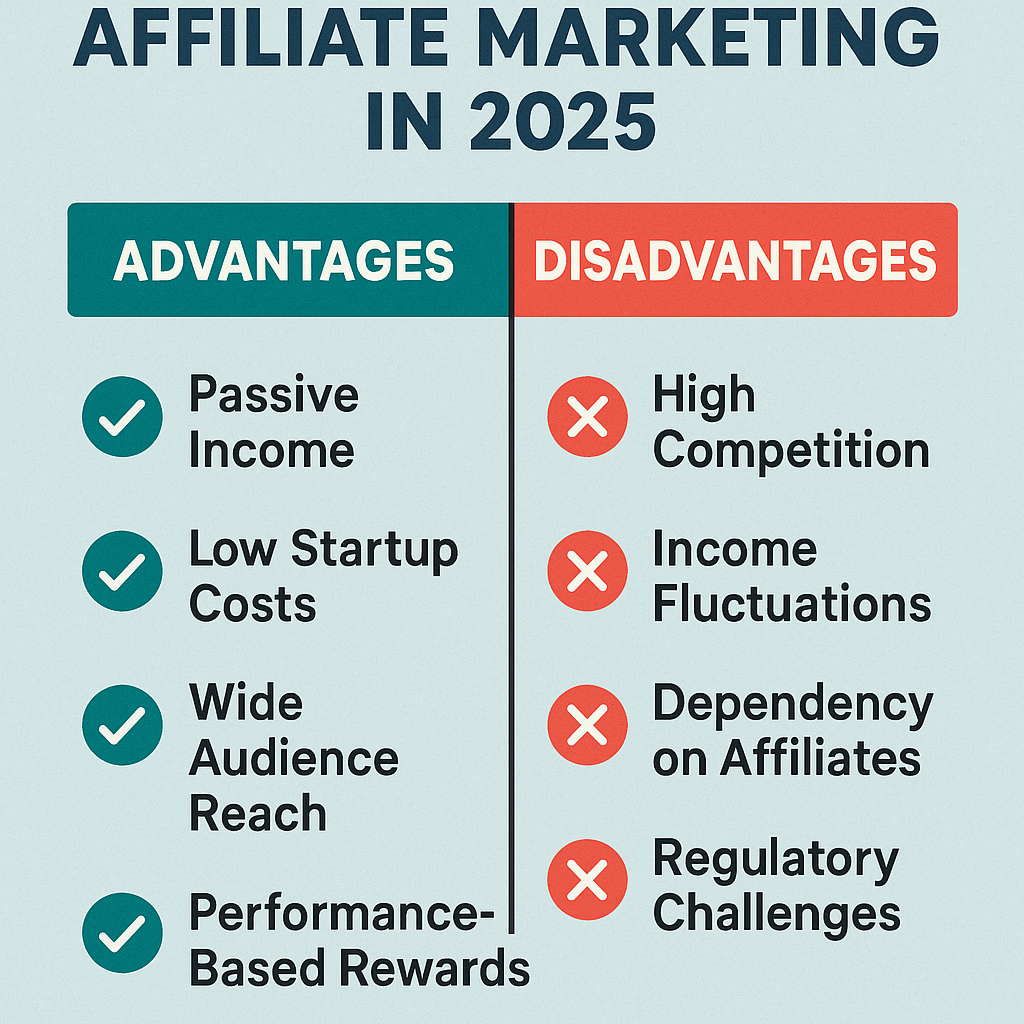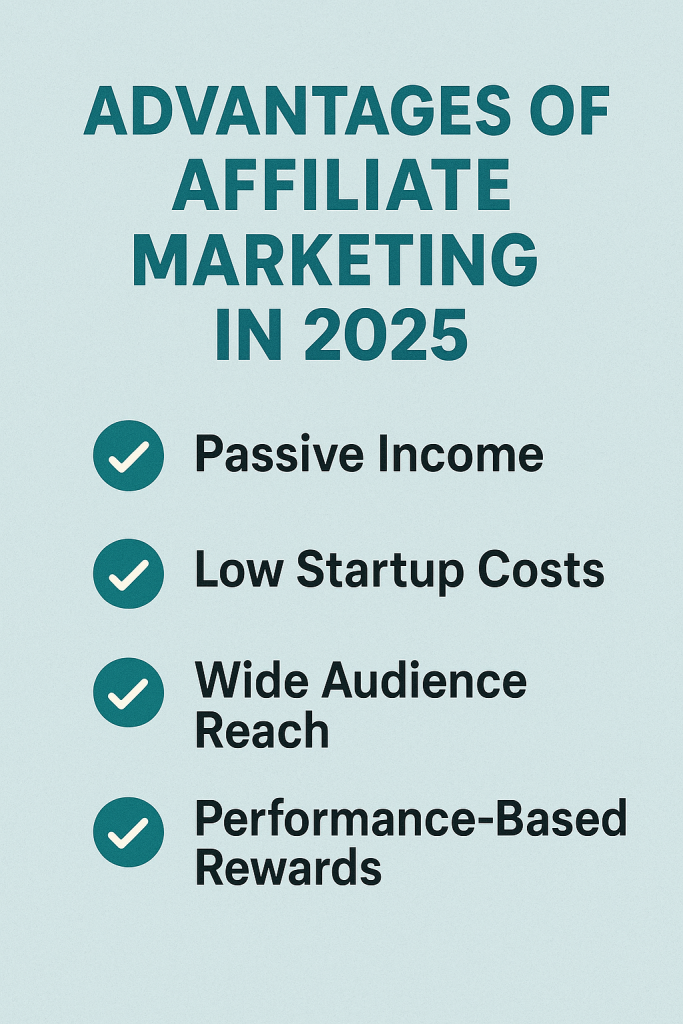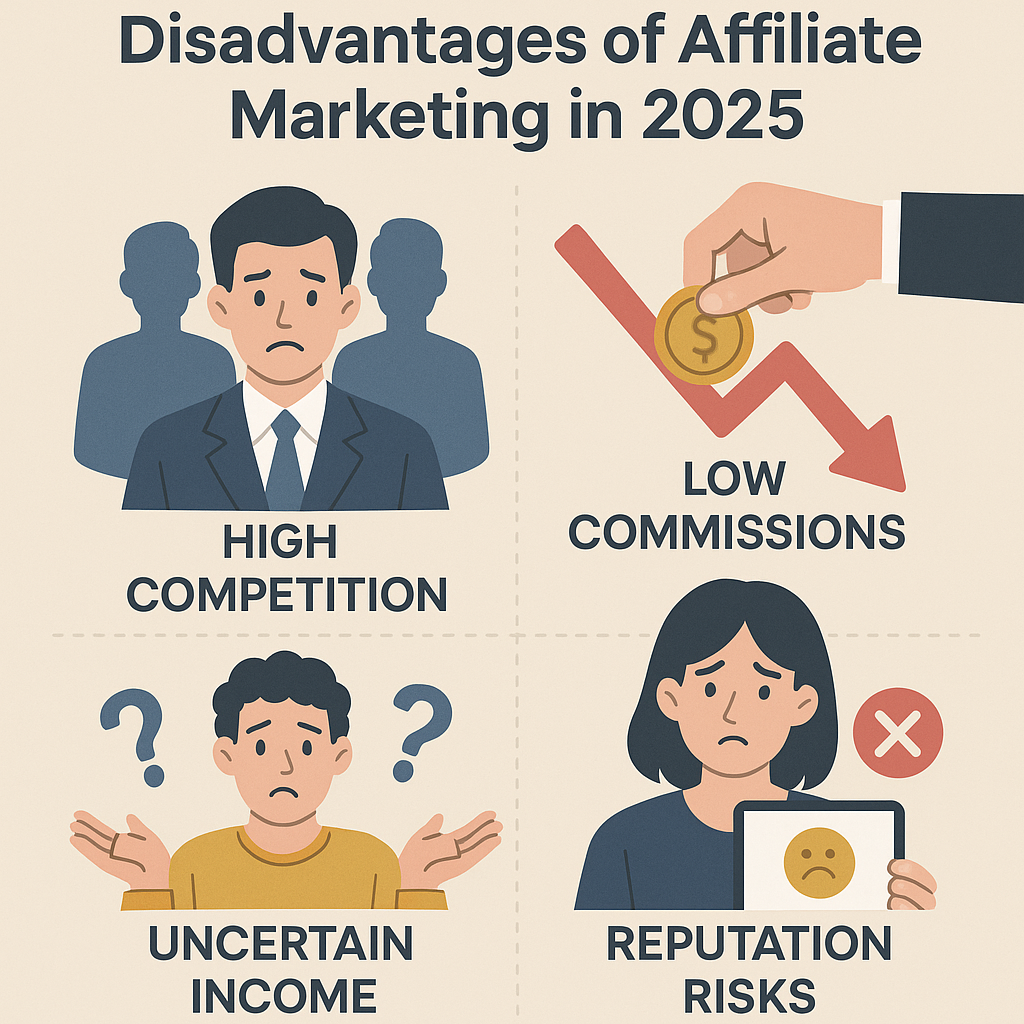
Introduction
Affiliate marketing has emerged as one of the most lucrative online business models, allowing individuals and businesses to earn commissions by promoting products or services from other companies. As we step into the year 2025, it becomes crucial to evaluate the advantages and disadvantages of this marketing strategy, especially in an era where digital transformation and consumer behavior are rapidly evolving.
This blog post aims to provide a balanced view on affiliate marketing, highlighting the benefits that make it an attractive option as well as the challenges that potential affiliates may face in the current landscape. By understanding both sides, readers can make informed decisions about whether or not to venture into affiliate marketing.

Affiliate marketing is a performance-based marketing strategy where an individual or business (the affiliate) promotes another company’s (the merchant’s) products or services and earns a commission for each sale or specific action generated through their marketing efforts. Affiliates utilize various channels—like websites, blogs, social media, email marketing, and more—to reach potential customers and encourage them to make a purchase or complete a desired action.
Brief History and Evolution Leading Up to 2025
The roots of affiliate marketing date back to the mid-1990s when Amazon launched its affiliate program, allowing website owners to earn commissions by linking to Amazon products. Since then, the industry has evolved dramatically, with advancements in technology and shifts in consumer behavior. By 2025, affiliate marketing has integrated AI-driven analytics, automated marketing tools, and personalized marketing strategies that cater to specific audiences.
Current Trends in Affiliate Marketing
As we approach 2025, several key trends are shaping the affiliate marketing landscape:
- Increased focus on influencer marketing: Brands are leveraging social media influencers to reach target audiences authentically.
- Integration of AI and machine learning: Affiliates are utilizing advanced algorithms to predict consumer behavior and optimize their campaigns.
- Mobile-first strategies: With the rise of mobile shopping, affiliates are focusing on mobile-optimized content.
- Focus on niche markets: Affiliates are finding success by targeting specific niches rather than competing in saturated markets.
Advantages of Affiliate Marketing in 2025

One of the most significant advantages of affiliate marketing is the low barrier to entry. Aspiring affiliates can start their journey with minimal investment. Unlike traditional businesses that require substantial capital for inventory, equipment, or storefronts, affiliate marketing allows individuals to promote products or services without the need for upfront purchases. This makes it an accessible option for anyone looking to generate income online.
Affiliate marketing offers a unique opportunity for passive income. Once an affiliate establishes their marketing channels and creates content, they can continue to earn commissions from sales generated through their links without needing to be actively involved. This means that affiliates can potentially earn money while they sleep, travel, or engage in other activities, making it an attractive option for those seeking financial freedom.
Another appealing aspect of affiliate marketing is the flexibility it provides. Affiliates can work from anywhere in the world, whether from home, a coffee shop, or a beach. This work-from-anywhere model allows individuals to set their schedules and work at their own pace. As we progress through 2025, this flexibility continues to resonate with the growing number of remote workers seeking a better work-life balance.
Affiliate marketing encompasses a wide range of niches, offering affiliates the chance to choose areas that align with their interests and expertise. Whether it’s health and wellness, technology, fashion, travel, or finance, there are countless opportunities for affiliates to find their niche and build a following. This diversity enables affiliates to connect more authentically with their audience, leading to higher conversion rates and sustained earnings.
In affiliate marketing, earnings are directly linked to performance. Affiliates earn commissions based on their ability to drive traffic and conversions. This performance-based model motivates affiliates to continually refine their marketing strategies and optimize their campaigns. Unlike traditional employment, where salaries are fixed, affiliates have the potential to earn significantly more as they improve their marketing skills and expand their reach.
Disadvantages of Affiliate Marketing in 2025

While affiliate marketing offers many advantages, it is also marked by high competition. As more individuals recognize the potential for earning income online, the market has become saturated, particularly in popular niches. New affiliates may find it challenging to stand out among established players, making it essential to identify unique selling propositions and innovative marketing strategies to gain traction.
B. Dependency on Merchant Reliability
Affiliates depend on merchants to fulfill orders, manage inventory, and handle customer service. This dependency can be risky if a merchant does not deliver on their promises or experiences issues that affect the affiliate’s earnings. For instance, if a merchant decides to change their commission structure or discontinues a product, affiliates can find themselves in difficult situations. Therefore, it is crucial for affiliates to research and choose reliable merchants to partner with.
Unlike a traditional job with a steady paycheck, affiliate marketing income can be highly variable. Factors such as seasonal trends, market demand, and changes in consumer behavior can lead to fluctuations in earnings from month to month. Affiliates must be prepared to manage this variability and may need to diversify their income streams to maintain financial stability.
Successful affiliate marketing requires a solid understanding of digital marketing strategies, SEO, content creation, and analytics. For newcomers, this learning curve can be steep and may require significant time and effort to master. Continuous learning is essential, as digital marketing trends and algorithms are constantly changing. Affiliates must stay informed and adapt their strategies to remain competitive.
E. Potential for Misleading Practices
The affiliate marketing industry, while lucrative, is not without its pitfalls. Some affiliates may resort to misleading practices, such as making false claims about products or using deceptive marketing tactics to drive conversions. This can harm the reputation of not only the affiliate but also the brands they promote. It’s essential for affiliates to uphold ethical standards and build trust with their audience through honesty and transparency.
Tips for Success in Affiliate Marketing

To succeed in affiliate marketing, aspiring affiliates need to adopt effective strategies and best practices. Here are some tips for standing out from competitors and achieving success:
- Identify Your Niche: Focus on a specific niche where you can leverage your expertise and passion. By honing in on a targeted audience, you can create tailored content that resonates with your followers.
- Build Trust with Your Audience: Authenticity is key in affiliate marketing. Share your honest opinions about products and services, and only promote those that you truly believe in. Building trust will lead to higher conversion rates.
- Utilize Data Analytics: Leverage data analytics to track the performance of your campaigns. Understanding which strategies yield the best results enables you to refine your approach and optimize your marketing efforts.
- Invest in Quality Content: Create high-quality content that adds value to your audience. Whether through blog posts, videos, or social media, engaging and informative content can enhance your credibility and attract more visitors.
- Stay Updated with Industry Trends: The digital marketing landscape is ever-evolving. Stay informed about the latest trends and technologies to ensure that your strategies remain relevant and effective.
In summary, affiliate marketing presents a range of advantages, such as low startup costs, passive income potential, flexibility, diverse opportunities, and performance-based earnings. However, it also comes with its set of challenges, including high competition, dependency on merchant reliability, income variability, a steep learning curve, and the potential for misleading practices.
As we look toward the future of affiliate marketing in 2025 and beyond, it is essential for aspiring affiliates to weigh these advantages and disadvantages carefully. By approaching affiliate marketing thoughtfully and strategically, individuals can navigate the unique landscape of this industry and find a path to success. The rewards can be substantial for those who are willing to invest the time and effort to learn and adapt.
Ultimately, affiliate marketing can be a fulfilling and profitable venture when approached with dedication, integrity, and a commitment to continuous improvement.

